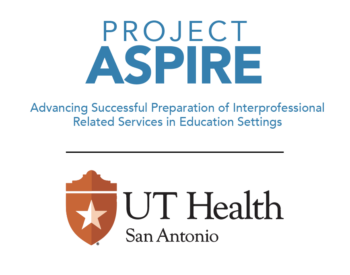An interprofessional workforce development project led by School of Health Professions faculty and funded by a $1.2 million grant from the Department of Education Office of Special Education Programs aims to address the shortage of highly qualified occupational therapists and speech-language pathologists trained to serve school-age children with high-intensity needs.
The five-year grant will support Project ASPIRE: Advancing Successful Preparation of Interprofessional Related Services in Education Settings. The goal of Project ASPIRE is to prepare UT Health San Antonio occupational therapy and speech-language pathology graduate students who are committed to working with school-age children with high-intensity needs, such as autism, speech and language disorders and developmental delays.
“The exciting thing about Project ASPIRE is it will provide a path from knowledge to implementation to prepare scholars to provide services to school-age children with disabilities who also have high-intensity needs,” said Bridgett Piernik-Yoder, PhD, OTR, FAOTA, associate dean for academic affairs in the School of Health Professions and chair of the Department of Occupational Therapy.
“It is a fantastic opportunity to support students who are committed to pursuing this area of practice, while advancing our school’s mission of meeting the needs of our community — including those of school-age children.”
According to the National Coalition on Personnel Shortages in Special Education and Related Services, shortages in special education and related services personnel are reported across the nation, resulting in limited access to services needed for student success and impeding the ability to provide prevention and early-intervention services.
Increasing the number of trained occupational therapists and speech-language pathologists will benefit children in areas that tend to have fewer providers.
“The innovative interprofessional ASPIRE program provides evidence-based training and experience for future occupational therapy and speech-language pathology clinicians to meet the rising needs of children in under-resourced and rural areas,” said Associate Dean for Research and Professor Timothy Reistetter, PhD, OTR, FAOTA.
Doctor of Occupational Therapy and Master of Science in Speech-Language Pathology students can apply to become Project ASPIRE scholars at the end of the first year of their academic programs. Project ASPIRE scholars will complete an evidence-based, enhanced interprofessional curriculum that includes clinical practicums in addition to their program curriculum. Scholars will receive a stipend toward tuition and other expenses, and after graduation, they will receive ongoing telementoring support. Scholars commit to work in a school-based practice setting with students with high-intensity needs after graduation.
The application process for the first cohort of 12 scholars will begin in spring 2025, and the program will begin in summer 2025. About 50 scholars will be trained over the course of the project, Piernik-Yoder said.
Project ASPIRE is interprofessional in both its design and leadership. The project is run and supported by faculty from the Department of Occupational Therapy and the Department of Communication Sciences and Disorders. Fang-Ling Lu, PhD, CCC-SLP, chair of the Department of Communication Sciences and Disorders, is the project’s co-director, and Assistant Professor Mei-Ling Lin, PhD, OTR, serves as co-investigator. Project faculty include Autumn D. Clegg, EdD, OTR, associate professor/clinical in the Department of Occupational Therapy, and Angela Kennedy, SLP-D, CCC-SLP, director of clinical education in the Department of Communication Sciences and Disorders.


